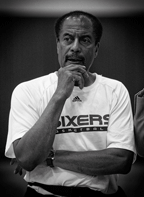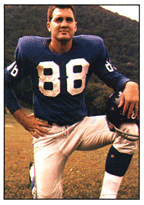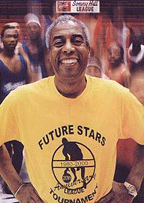| |
|
|
| |
It has been said that your league has done more than prepare kids for college basketball; it has prepared them for life. Give us a couple of the success stories.
|
|
| |
|
|
| |
I have always looked at it from the standpoint of, What are you going to do after basketball? It’s easy to say, “I’m going to play basketball—I’m going to play in college and maybe go to the pros.” But even if you’re going to do that, you have to understand that there is a life after basketball. I have always been about the whole person. So we’re trying to develop the whole person.
We have interacted with so many kids. Some have become ministers, some have gone into the medical field, some have gone into law enforcement. We have also had those who have fallen by the wayside, people who have gotten caught up in drugs, people who have gotten caught up in the system, incarceration. Some of them come to you and say, “I didn’t understand what you were doing at that point, but now I’m teaching my youngster the same thing.” So I look at it as a blessing to develop so many youngsters over the years. We have probably touched over a 100,000 youngsters. It’s not all about basketball.
|

Sonny Hill.
Philadelphia Tribune
|
| |
|
|
| |
There is a story about how one year you stepped in during a teachers strike and basically ran high school basketball in Philly. How did that go down?
|
|
| |
|
|
| |
It’s probably one of the top three things that I have done in terms of the basketball program. We had a teachers strike, and the youngsters were going to lose the basketball programs in the public school league. So I decided that what I would do is run a Sonny Hill Winter League. The coaches in the Sonny Hill Summer League each took a particular high school. Most of the high school coaches allowed their players to get involved. We ended up having a great season. Youngsters who might not have had an opportunity to get scholarships ended up getting scholarships. Youngsters who would not have gotten the opportunity to play their senior year of high school didn’t get wiped out. Many of them to this day still speak highly of the experience and what it meant to them.
|
|
| |
|
|
| |
Among the players nurtured in the Sonny Hill League were Mike Bantam, Lionel Simmons, Hank Gathers, Rasheed Wallace and Kobe Bryant. Who was the best young player you saw come through the Sonny Hill system?
|
|
| |
|
|
| |
That’s very hard to say because we’ve had so many of them over the years. But one player who stands out is Andre McCarter. He came to us initially when he was 14. He then went on to become a fabulous player at Overbrook High School and UCLA, and played on John Wooden’s last championship team. Andre was that good. Mike Bantam also stands out because he was the first winner of the Wilt Chamberlain Award that we gave out for the player who had the potential to be a pro prospect.
|
|
| |
|
|
Sonny’s resume includes a huge media presence in the Philadelphia market, dating back to the late 1960s. He has worked as a member of the 76ers radio team for more than four decades, and even did a groundbreaking stint as an analyst for CBS’s national TV games in the 1970s.
|
|
| |
|
|
| |
How did the job working 76ers broadcasts come about?
|
|
| |
|
|
| |
That’s something I did at the end of my basketball-playing career. I still had a contract to play in the Eastern League for a lot more money than I would have received as a broadcaster. What happened was that Tom Gola, who was doing the 76ers home games, decided he was going to go back and coach LaSalle. I wrote a letter to WCAU, which is now 1210, and said I would like to be able to do radio. They spoke to Jack Ramsey, who was the team’s General Manager at the time. Jack knew my reputation and said he thought it would be a good idea. That’s how I got a chance to get into broadcasting. That led to me being a broadcaster for 42 years now, since 1969.
|
|
| |
|
|
| |
How did that lead to your gig on CBS in the 1970s?
|
|
| |
|
|
| |
I actually got that position through National Football League Films. They did a documentary on the Sonny Hill and Baker League, which was seen by many people. CBS saw it, and they asked me to come up and interview. Obviously, I did a good job because they gave me the opportunity.
|
|
| |
|
|
| |
Before you came along the guys doing color on national broadcasts were talking heads who didn't do much to educate fans. You changed that. Did you face any resistance to your style of game-calling?
|
|
| |
|
|
| |
Yes. I had to keep it more strict. You have to understand that being one of the first blacks to be in that position, I was under tremendous scrutiny. Fortunately for me I was rather articulate. I dressed well. I carried myself well. And I had a great presence on TV with the camera. So I used all of that to my benefit.
Of course, there was envy from some of the people that I worked with. But I also got a lot of support. Tom Brookshier supported me, Jack Whitaker supported me, Pat Summerall supported me as an on-air talent. They were big talents back in those days. They helped me a great deal for the four years that I was there.
|
 Pat Summerall, 1981 TCMA
Pat Summerall, 1981 TCMA |
| |
|
|
 |
Your radio program, “The Living Room," has been on the air close to 25 years. How do you keep it fresh for your audience and interesting for you?
|
|
| |
|
|
| |
It’s an open forum. The reason it’s called The Living Room is because back in the day, that’s where you had your conversations when somebody visited your house. They sat in your living room. So it’s just open conversation. It has no boundaries as to what we talk about. People think about it from a sports point of view, but it’s not just about sports. It’s about life. I try to share with listeners the opportunities and experiences I’ve had, and talk about all the different people who have played a role in my life. That’s how I keep it fresh. We’ve been doing it for over 23 years and I am very fortunate to have people in management who like what I do and allow me to do what I do. That’s a big part of it.
|
|
| |
|
|
In 1994, Sonny was among those rumored to be in contention for the 76ers GM job. John Lucas was eventually hired as coach and GM, with less than positive results.
|
|
| |
|
|
| |
What qualities do you think you would have brought to that position?
|
|
| |
|
|
| |
I had the labor background. I had the business background. I had the basketball background. I had the people skills. I know talent.
|
|
| |
|
|
| |
Looking back, could you have accomplished all you’ve done without the big personality that Sonny Hill is famous for?
|
| |
|
|
| |
I think all of that comes through my grandmother. I think it comes through my family. They all allowed me to be who am I am and do what I do. The people who I have come into contact with have not tried to stifle me as a person, stifle my personality. I’ve been very fortunate, because sometimes you run across people who misunderstand the outgoing personality.
|
|
| |
|
|
| |
There's no Sonny Hill in New York, Los Angeles or Chicago. So maybe the question is: Could anyone else have accomplished what you have?
|
|
| |
|
|
| |
I think people have accomplished it, in their way. The difference is that I never used basketball as a vehicle to develop basketball players. Others have gotten caught in the basketball, which is easy to do, because in our country winning is important. What I try to tell people in my program is that you can win and lose, and lose and win. You can win a basketball game, but you can lose what you’re trying to accomplish. And you can lose a basketball game, but win what you’re trying to accomplish. We’re trying to accomplish raising young people. We’re not trying to raise the next Kobe Bryant or Joe Bryant or Rasheed Wallace or Gene Banks—or any of the great players that we have had over the years. We’re more interested in the fact that we can work with them as young people.
I don’t think that part of the program has ever been adopted outside of Philadelphia. When you think about other programs, these programs are mainly built off of the basketball. We don’t ride the coat tails of basketball players. We ride the coat tails of being good human beings. That’s our legacy. We don’t want people coming to us telling us how great the basketball is, we want them coming to us telling us how great the program is. How the program has helped everybody. That, to us, is what’s really important.
|
 Sonny Hill,
Sonny Hill,
Philadelphia Tribune |
| |
|
|
   |




